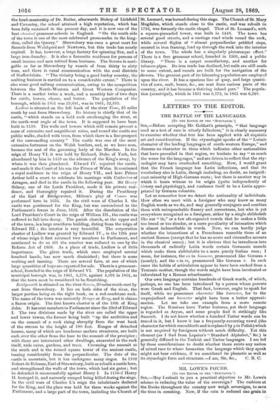LETTERS TO THE EDITOR.
THE BATTLE OF THE LANGUAGES.
[TO THE EDITOR OF THE " EPEOTATOR1 SIR,—Before accepting Mr. Geldart's principle, "that language used as a test of race is utterly fallacious," it is clearly necessary to examine whether that test has been applied with all requisite art and consideration. If the etymologist speaks of the " Latinic character of the leading languages of south-western Europe," and discerns no character in them which indicates other nationalities that have prevailed in that region, we hesitate to say "so much the worse for the languages," and are driven to reflect that the ety- mologist may have overlooked something. Now, I would grant that the French language has Latin inflections, and that its vocabulary also is Latin, though including, no doubt, an insignifi- cant minority of High-German roots ; but there is another way in which it bears witness to its origin (quite independently of history and physiology), and confesses itself to be a Latin appro- priated by German colonists.
Let us remember how we detect the nationality of individuals. How often we meet with a foreigner who may know as many English words as we do, and may generally conjugate and combine them with unimpeachable fluency and correctness, but who is yet everywhere recognized as a foreigner, either by a single shibboleth like our " th," or a few oft-repeated vowels that he makes a little too broad or too slender, or a mere peculiarity of intonation which is almost indescribable in words. Now, we can hardly judge whether the intonations of a Frenchman resemble those of an ancient Roman (except that he has no acute and circumflex accents in the classical sense) ; but it is obvious that he introduces into thousands of radically Latin words certain Germanic sounds which make them shibboleths to a more purely Italian race ; I mean, for instance, the en in honneur, pronounced like German 5 (nearly), and the u in tu, pronounced like German ii. In such cases the habits of articulation appear to have been sucked from a Teutonic mother, though the words might have been inculcated or inferulated by a Roman schoolmaster.
Our own language contains hundreds of Greek words, of which, perhaps, no one has been introduced by a person whose parents were Greek and English. That fact, however, ought to speak for itself, while we pronounce character like karacter, for to the unprejudiced ear haracter might have been a better approxi- mation. Let me take one example from a more remote region. The Russians have Tartar features, yet their language is regarded as Aryan, and some people find it strikingly like Sanscrit. I do not know whether a hundred Tartar words can be traced in it, but I know it has a frequently-recurring vowel (the character for which resembles& and is replaced by y in Polish) which is not acquired by foreigners without much difficulty. Yet this element (as I find from Lepsius's "Standard Alphabet," &c.) is generally diffused in the Turkish and Tartar languages. I am led by these considerations to doubt whether there exists any nation of mixed race to whose formation the language which they speak might not bear evidence, if we considered its phonetic as well as its etymologic form and structure.—I am, Sir, &c., C. B. C.






























 Previous page
Previous page